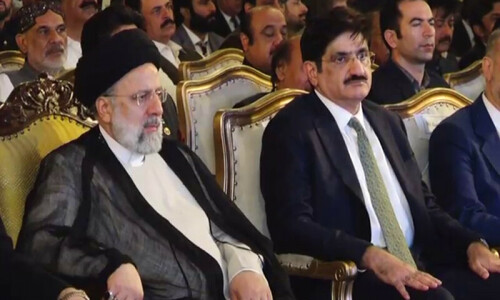KARACHI: There are five industrial estates in Karachi, but not a single combined effluent treatment plant (CETP) is in place to treat the industrial waste which is being mixed with the city’s sewage and falls into the sea untreated causing not only a substantial ecological disaster, but also human inconvenience and health risk, said the report of a judicial body.
In its fourth progress report placed before the apex court recently, the Supreme Court-mandated commission on water and sanitation in Sindh stated that due to its persistent efforts the federal government had approved a scheme for the establishment of five CETPs for the city.
The project cost would be Rs11.8 billion, of which 67 per cent would be financed by the provincial government and the remaining 33pc cost would be borne by the federal government, it added.
The one-man commission, headed by retired SC Justice Amir Hani Muslim, was established in January this year to implement the directives of the apex court to improve sanitation facilities, environment and potable drinking water in the province.
.Sindh govt will finance 67pc of the total Rs11.8bn cost of the project
The progress report stated that the work on these five proposed CETPs would be started in the third week of November.
It further stated that there was also no such plant for industrial waste of the Nooriabad industrial area and the administrative process to set up a CETP in the area had been completed and approved and the work would begin in the second week of November.
The CETP at the Kotri industrial area was built with a cost of around Rs800 million but it never achieved the desired results and the commission granted time on many occasions after the provincial authorities had been seeking time to make the plant efficiently functional, but to no avail, it added.
The report further said that two teams were assigned to suggest a way forward and both arrived at a similar conclusion highlighting the design and execution deficiencies. Therefore, the commission decided to rectify these deficiencies of the plant by making industries department responsible for submitting a PC-I.
Besides, the commission also directed the industrialists to install pre-treatment plants and septic tanks within the premises of their industrial units in Karachi.
S-III termed a comprehensive plan
The commission’s report said that the Greater Karachi Sewage Treatment Project, commonly known as S-III, was a comprehensive plan aiming at treatment of sewage, worked out to ensure that not a single drop of untreated water was discharged into the sea.
It added that this would have a long-term environmental effect apart from creating a new source of “grey water” which can be utilised after treatment for many purposes ranging from agriculture to industrial use.
The S-III has various components including sewage treatment plants (STP-I, II, III, IV and V).
When the commission began its work in January, the physical progress of the STP-I project was at a mere 3pc. However, it had now reached at 45pc and the plant would start functioning by December, it added.
The rehabilitation of 77 million gallons daily (MGD) STP-III at Mauripur had been completed and the project was inaugurated by the chief justice of Pakistan in July, the progress report said, adding that the work to increase its capacity was in progress and after complete rehabilitation it would attain its full capacity of 180 MGD by Dec 2019. Both these plants will cover the Lyari basin covering more than half of the city’s population.
The proposed STP-II and IV have been merged into one plant with a treatment capacity of 180 MGD and it will cover the Malir basin and Mehmoodabad area including certain phases of Defence Housing Authority.
The tendering process of this plant had started and work would commence after the completion of formalities. The project would be completed in three years, but the commission was striving to reduce it to two years by expediting various processes, it added.
On the intervention of the commission, the Karachi Port Trust had committed to build a 100 MGD treatment plant (STP-V) at Mai Kolachi and the case for reservation of land for this purpose after mutual agreement of the KPT and Board of Revenue had already been sent to the government and expected time of completion of this project is two years. This plant will cover the remaining parts of the city.
The commission also mentioned in its progress report about the many directives issued to the DHA to take measures to stop discharge of untreated water into the sea especially around Seaview area.
Published in Dawn, September 9th, 2018













































